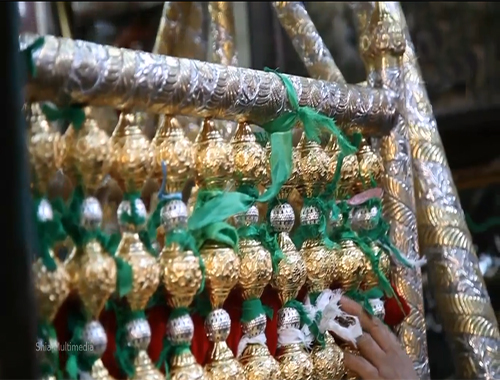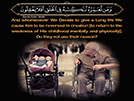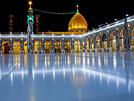Verses 11-17
- Details
- Hits: 2729
Sura Tariq
(The Night)
No.86 (Verses 11-17)
(11)وَالسَّمَاءِ ذَاتِ الرَّجْعِ
(12) وَالْأَرْضِ ذَاتِ الصَّدْعِ
(13) إِنَّهُ لَقَوْلٌ فَصْلٌ
(14) وَمَا هُوَ بِالْهَزْلِ
(15) إِنَّهُمْ يَكِيدُونَ كَيْدًا
(16) وَأَكِيدُ كَيْدًا
(17) فَمَهِّلِ الْكَافِرِينَ أَمْهِلْهُمْ رُوَيْدًا
11. By the rain giving heaven, (the returning rain),
12. And by the earth splitting (with plants):
13. Most surely it (the Qur'an) is a decisive word,
14. And it is not a thing for amusement.
15. Surely they are plotting a scheme (against the truth),
16. And I am (also) planning a scheme (against them),
17. Therefore grant a delay to the unbelievers: give respite to them gently (for a while).
Commentary:
We Destroy the Enemies' Plans.
Their plots will be of no avail, and Allah's purpose will prevail.
To follow the previous verses which were about the Resurrection and realizing it by taking note of the creation of Man from sperm, the following verses continue the same theme, however, for further emphasis and with more evidences. It says:
By the rain giving heaven, (the returning rain),
* * * *
And by the earth splitting (with plants)
* * * *
Most surely it (the Qur'an) is a decisive word,
that you will return to life.
* * * *
And it is not a thing for amusement.
The term /raj'/ is based on /ruju'/ 'return'. In the Arabic language 'rain' is called /raj'/, because water evaporates from the earth and the seas, rises to form clouds and then once again comes back down as rain; raining intermittently.
The term /sad'/ means 'to split' and together with what was said about /raj'/ 'rain' it means splitting of dry, hard earth after rainfall and, also, the growth of plants.
In fact, these two verses point to dead lands which survive by life-giving rain. This is what the Qur'an has repeatedly mentioned as an evidence for the Resurrection. For example, in Sura Qaf, No.50, Verse 11 it says: ..And We give (new) life therewith to land that is dead: thus will be the Resurrection.
So there is an obvious relation between these oaths and what the oaths are taken for, This is one of the wonders of the Qur'an's eloquence, that there is an interesting relationship between the oaths and what the oaths are for.
Sura Hajj, No.22, verse 5 confirming the Resurrection, refers to both evidences of Man's creation from sperm and its various stages in the form of foetus, and giving life, again, to dead lands by sending down rain, and in this very Sura, Tariq, it emphasizes on both of them as well.
The phrase /qaul..un-fasl/ 'a decisive word', is a statement that definitely separates Good from Evil. A group of commentators, considering the aforementioned verses, have related the statement to Resurrection while some others believe it means 'the Holy Qur'an' as some narrations of Ahlul-Bayt (p.b.u.th.) confirm, too.
Of course, the terms /yaum-ul-fasl / with the meaning of 'Hereafter' is used and mentioned in several verses of the Qur'an.
It is, also, probable that the terms /qaul-un-fasl/ mean 'the verses of Qur'an' some of which announce the Resurrection. Then, both of the above commentaries can be combined.
A quotation from the Holy Prophet (p.b..u.h.) has been said to have been narrated by Hazrat Ali (p.b.u.h.), thus: 'There will be a sedition among you soon,' the Prophet said. I asked him what the remedy for it was, and he answered: 'Qur 'an is the remedy which tells you about the past and the future and your Judgement. It is a statement that separates right from wrong. It is a serious word. It is not in vain. Allah will defeat any oppressor who leaves Qur'an. And the person who seeks divine guidance anywhere save Qur'an will be led astray by Allah'. (1)
Then, to console the Prophet (p.b.u.h.) and the believers both, on the one hand, and for threatening the enemies of Islam, on the other hand, it says:
Surely they are plotting a scheme (against the truth),
* * * *
And I am (also) planning a scheme (against them),
* * * *
Therefore grant a delay to the unbelievers: give respite to them gently (for a while).
Verily, they always plan wicked schemes to oppose you. Sometimes they mock you. Sometimes they lay siege on you, economically. Sometimes they torture the believers. Sometimes they tell others not to listen to the Qur'anic recitation and make noise in order to be victorious. Sometimes they call' you a soothsayer, mad, etc. Sometimes they believe Islam in the morning, but they disbelieve in the evening on the same day to attract some believers to follow them. Sometimes they tell you that only the poor and miserable people believe you and follow you, then leave them until they (the unbelievers) come to you. Sometimes they ask you to accept some of their gods, at least, until they follow you. And, sometimes they plan a scheme to banish you or kill you.
In short, every moment the unbelievers can try a new plot to disperse your followers and oppress the believers, or abolish you in order to extinguish Allah's light.
But, they should know that Allah will not allow them to do so, and He has taken a decision to spread the light of Islam over the world and then the light of Allah cannot be extinguished with a blow from their mouths.
This bright ever-shining light will not be put out by the plots of these unregenerate men who plan; but Allah, too, plans.
The term /kayd/ 'to plot against' is applied both to plotting with an evil purpose (which is used more than the other usage), and planning with a good purpose, such as Sura Yusef, No.12, verse 76 which says: ... Thus did We plan for Yusef (Joseph).
The meaning of the enemies' plot , in this verse, is clear with the above explanation about some of the evils of the unbelievers.
There are many evil plots and wicked plans of this kind, with an evil purpose, mentioned in the Qur'an, but what is the meaning of Allah's plan, in this verse, of having a good purpose? Some commentators believe that 'granting a delay to the unbelievers' which ends with their painful punishment, is its meaning. Some others think that 'the punishment itself' carries the meaning.
It is more suitable to say that it means the same beneficence that the Prophet (p.b.u.h.) and the believers got from Allah. They, after respiting the enemies, caused them to be neglectful and rendered their efforts ineffective, then, their plans remained fruitless.
In these verses the Prophet (p.b.u.h.) is deliberately ordered to act toward them moderately and give respite to them and not hurry to destroy them; to let them have the final notes, to wait for a few of them who have a little readiness to come to Islam.
It is noteworthy that, at first, it says: Therefore grant a delay to the unbelievers" and then it emphasizes: ...give respue to them gently for a while). It says the same matter twice for emphasis, but in a different way and with various words so as not to be taken unpleasantly.
The term /ruwayda/ is based on /rud/ 'to try to do something gently', but, here it means: give respite to them for a while.
Thus, in this short verse three times Allah orders His Prophet to act with them moderately, and this is a good example for all Muslims to be patient and careful in their affairs especially when they are faced with their powerful and dangerous enemies. They should avoid haste and doing things undesigned or at an inappropriate time.
Moreover, it is better for the Prophet (p.b.u.h) to be patient in delivering the Message of Allah in order to respite all those who may believe, and to complete the argument and reason for all of them.
The reason why this respite has been counted short, may be because Islam overcame its enemies in a short time and their plans did not profit them. The first failure was at the battle of Badr. Then, later their plans failed, again, in the battles of Ahzab, Kheybar, Seffin and so on. At the end of the Prophet's life, they were completely weak when the light of Islam spread throughout the Arabian Peninsula: and before the end of one century, it covered most parts of the world at that time.
Or, it may be that the punishment of the Hereafter is near and basically everything which is definite and sure is counted close.
However, this Sura begins with oaths to the sky and stars, and ends with threats to the unbelievers who plot and scheme against the beneficent purpose of Allah. There are also some nice evidences to the Resurrection in some elegant sentences about the angels, who are the protectors of Man, and for soothing the believers. These verses are not only short and meaningful, but also beautiful and decisive.
* * * *
Supplication:
O Lord! The plots and schemes of the enemies are many in our time. Turn them to themselves and make their evil plans invalid.
O Lord! On the Day when all the secrets will be made manifest, please put us not to shame.
O Lord! We have no power or helper save You. Leave us to no one else, but to Yourself.
(1) 'Sahih-i-Tarmathi' and 'sunan-i-Darami based on the quotation of 'Ruh-al-Ma'ani, The Commentary, vol. 3, p. 100 and 'Tafsir-i-Maraqi, vol.30, p. 118.
The End of Sura Tariq
(The Night)











